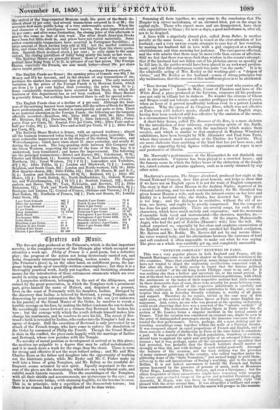gratrto net aluoir.
The five-act play produced at the Princess.; which is the last important novelty, is the complete reverse of the Olympic play which occupied our attention a week ago. Philip of France is a good poem, but a defective play ; the progress of the action not being dexterously carried out, and being frequently interrupted by retarding, useless scenes. The Templar (the Princess's piece) is, on the other hand, an indifferent poem, the lan- guage being made up of smoothly-written commonplaces • but then it is a thoroughly practical work, featly put together, and furnishing abundant means for the introduction of those extraneous ornaments which are ever useful in acting upon a mixed public.
A Languedoc nobleman, belonging to the sect of the Albigenses, and ruined by the great persecution, in which the Templars took a prominent part, gives himself the name of Hubert, and, disguised as a peasant, lives on the coast of Normandy with his daughter, Iselin. Enraged by the discovery that Isoline is beloved by Bertrand, a young Templar, and discovering by secret information that the latter is the son (yet unknown to his parent) of the Grand Master of the Order, he resolves to wreak a terrible revenge on his foes, by making the father condemn the son to death. He accordingly comes forward as a witness that Bertrand has broken his vow ; but the courage with which the youth defends himself makes him change his sentiments, and he resolves to save his life. The secret of Ber- trand's birth is revealed by Isoline, who rushes into the Templar's hall in an agony of despair. Still the execution of Bertrand is only prevented by an attack of the French troops, who have come to enforce the dissolution of the Order by command of Philip the Fourth. Though the Grand Master is slain in the conflict, the piece ends happily with the marriage of Isoline and Bertrand, whose vow perishes with the Temple.
No novelty of moral position or development is arrived at in this piece ; the motives are palpable to a degree that may be called melodramatic ; and it is much more a work for the stage than the closet. There is room for strong and effective if not the most refined acting ; and Mr. and Mrs. Charles Kean as the father and daughter take the opportunity of working out the histrionic points, while Mr. Ryder and Mr. C. Fisher make up well into a brace of grim Templars, and Mr. Belton as the youthful de- linquent seems actuated by new spirit. Equally important to the suc- cess of the piece are the decorations, which are on a very liberal scale, and exhibit much historic research. Thus the assemblages of the Templars, with all their shields and accoutrements, are picturesque to the eye ; and there is a first-rate bridge, with alarming fragility, for the heroine to cross. This is, in principle, only a repetition of the Sonnambula terrors ; but there is no reason that a good thing should not be done twice. Summing all facts together, we may come to the conclusion that The Templar is a clever melodrama, of an elevated kind, put on the stage in capital style. Those who expect more and are disappointed, have their own expectations to blame; for now-a-days, a good melodrama is, after all, not to be despised.
A farce with a singularly absurd plot, called Betsy Baker, is another novelty at the same house. A wife is vexed at the over-attention of her husband ; and a very unwise cousin attempts to cure her of her vexation, by making her husband fall in love with a girl employed at a washing establishment, and thus arousing her jealousy. The cure proves effectual, and the wife admits that there may be more evils than excess of affection. Still we feel that there was more hick than wisdom in the cousin's attempt that if the husband had not fallen out of his plebeian amour as speedily as he fell into it, the parties would have been placed in an awkward predica- ment ; and that this unfortunate result was quite "on the cards." It is to the admirable acting of Mrs. Keeley as the washing-girl—a "dragon of virtue," and Mr. Keeley as the husband—a man of strong principles but shy inelinations, that the success of this indifferent piece is to be attributed.


























 Previous page
Previous page